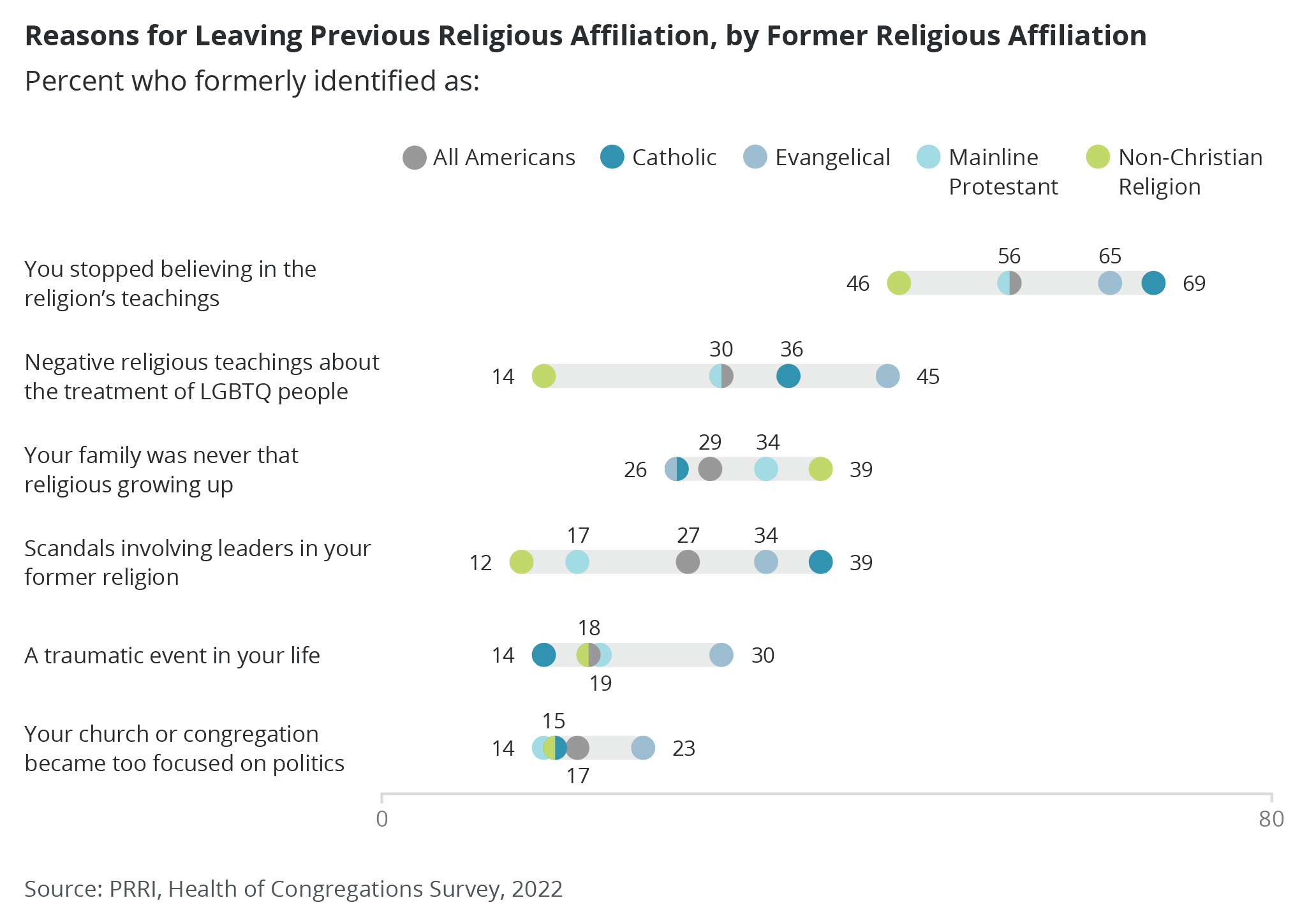As the United States becomes more religiously diverse and Americans become more likely to identify as religiously unaffiliated (27% as of 2023), a growing number of people are departing from their previously held religious traditions. PRRI’s Health of Congregations survey finds that people’s reasons for switching to a new religious tradition or denomination vary, but a majority of those who have made such a change (56%) say it was because they stopped believing in their former religion’s teachings. Another 30% indicate they were turned off by the religion’s negative teachings about or treatment of LGBTQ people, 29% say their family was never that religious growing up, 27% say they were disillusioned by scandals involving leaders in their former religion, 18% point to a traumatic event in their lives, and 17% say their congregation became too focused on politics. This Spotlight breaks down the various motivations of individuals who left different religious affiliations, looking at their former affiliations and which religious traditions they moved to.
Catholics make up 37% of those who have left their former religious tradition. Loss of belief was the primary reason for this group’s departure, with 69% of former Catholics citing it as a reason for leaving. Nearly four and ten of former Catholics (39%) departed owing to scandals involving religious leaders, 36% because of negative religious teachings about LGBTQ people, and 14% because of a traumatic event in their life. A quarter of former Catholics (26%) cited growing up in a family that was never that religious as a reason they left the church, and 15% left because their church or congregation became too politicized. Today, 50% of former Catholics are religiously unaffiliated and 25% are evangelical or Protestant.
Out of U.S. adults who have left a religious tradition, 11% were formerly evangelical. The majority of former evangelicals (65%) cited a loss of belief in the religion’s teachings as a reason they departed from the tradition. Almost half of former evangelicals (45%) cited negative religious teachings about LGBTQ people as a reason they left, while 34% said scandals involving leaders in their former religion motivated them to leave. Nearly three in ten former evangelicals said they left because of a traumatic event in their life (30%) or because their family was never that religious growing up (26%). About one in four (23%) said they left because their church or congregation became too focused on politics. Today, half of former evangelicals (50%) are religiously unaffiliated, a quarter (25%) have switched to a mainline/non-evangelical Protestant tradition, and 9% identify as Catholic.
Nearly one-quarter of U.S. adults (23%) who have left a religious tradition were formerly mainline/non-evangelical Protestant. More than half of former mainline/non-evangelical Protestants (56%) said loss of belief was a reason they left the church, and 34% said they left because their family was not very religious during their upbringing. Three in ten former mainline Protestants (30%) said negative religious teachings about LGBTQ people were a reason they left the tradition. Nearly two in ten (19%) said a traumatic event caused them to depart, 17% attributed their departure to scandals involving religious leaders, and 14% said they left because their church or congregation became too focused on politics. Today, 20% of former members of the mainline/non-evangelical Protestant tradition are evangelical and 10% are Catholic. Six in ten of those who have departed from the tradition (61%) now identify as religiously unaffiliated.
Former members of non-Christian religions, including Jewish, Muslim, Hindu, Buddhist, and Unitarian/Universalist Americans, make up 2% of those who have left a religious tradition. Nearly half of this group (46%) left their tradition owing to loss of belief, and about four in ten (39%) left because their family was not that religious growing up. Nearly two in ten of the members of this group (18%) attribute their departure to a traumatic event, 15% said they left because their congregation became too politicized, 14% said negative religious teachings about the LGBTQ community motivated them to leave, and 12% said their departure was due to scandals involving religious leaders. Today, 42% of former followers of non-Christian religions identify as unaffiliated, 22% identify as evangelical or Protestant, and 16% identify as Catholic.[1]

[1] The number of cases for this group is 96. Findings need to be interpreted with caution.




